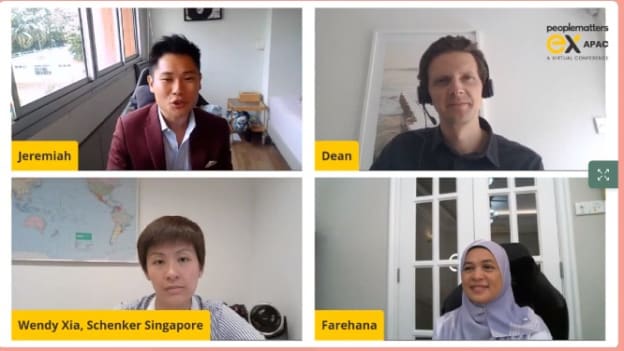The rise of data-driven talent development

This article was originally published in August 2021, as part of People Matters EX APAC Conference 2021.
The volume of data available to organisations is growing exponentially. The pandemic has fast-tracked how companies capture and analyse datasets. Top organisations today increasingly rely on analytics to make strategic business decisions. In fact, we see a whole new level of discussions around how HR can learn new data skills and employ advanced analytics to organisation’s biggest asset –people. Because there is a real need to relook at the development and coaching plan for employees in the hybrid workplace.
‘We have been capturing data for long, but how we use it and what do we use it for is evolving. For HR, what is important is not just about the technicalities but how you make insights relevant to your business,’ says Dean Summlar, VP, HR & Chief of Staff Pacific Zone, Schneider Electric at People Matters EX APAC Conference 2021. HR leaders must understand the reality of changing business dynamics and learn new skills like data analytics. New technologies to extract data are here, it’s about how you use them to your business benefits. Farehana Hanapiah, SVP, Group HRM, Petronas, echoes the same and adds that data is everywhere; what is important is how you mine data to employ insights to make right ‘people’ decisions. Today, parsing workforce data to extract insights from them is an increasingly sought-after skill in HR.
The data-driven journey
Organisations are at different levels of the data-driven journey because it is a process that involves tools, techniques, skills, and culture. ‘Petronas is undergoing a massive HR transformation and really changing the way we make decisions. We are working to identify the best talent to mobilise to best roles and opportunities so they can give their best to our organisation,’ adds Farehana. And obviously, data is at the core of this transformation, she adds.
When asked about what is DB Schenker doing in this data-driven economy to make intelligent people decisions, Wendy Xia, CHRO of the company says, ‘everyone stands a fair chance in the data economy. The first thing that we did is making everyone across different levels and functions in the company comfortable with data. Interestingly, we found several people with real interest in data analytics and we grouped them together. They were tasked with creating data awareness and literacy and help people use insights for decision-making'. The company installed interactive screens in every single warehouse so employees can see the output at a personal or organisational level in real-time, adds Wendy. This created a real impact in terms of awareness about the real power of data.
The data skills for HR
HR leaders need data skills given the mounting expectations from all stakeholders including employees’ sophisticated needs. First, it is critical for HR leaders today to understand the reality of changing business dynamics because ultimately they need to leverage insights to their business benefits, argues Wendy. The ability to quickly navigate the business reality is a must for HR. Talent leaders have to mirror the dynamics of business reality. Dynamic target setting, for instance, was never the norm before the pandemic. It used to be an annual process. All this requires HR to have open-mindedness. They need to be agile -- an iterative approach to devise initiatives that are framed around experimentation, and review supported by collaborative culture. HR should not just manage risks; they need to take risks. They can learn analytics skills but the openness and passion have to be there, adds Wendy.
Referring to their digital literacy programs, Farehana says, they have launched several courses on topics including data analytics so the entire organisation gets hang of a data-driven culture including the HR professionals. The company has launched a program called Innovative Engine which is to get talent together and drive ideating and coming up with new ideas for business development.
Finally, it’s important to build the capability for HR to correlate the insights with business needs, take the right measures and measure the impact.
















